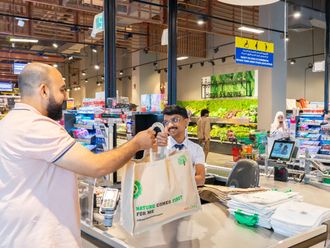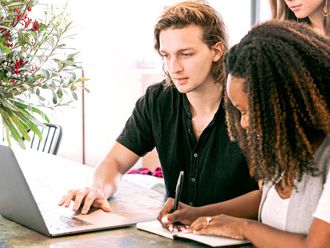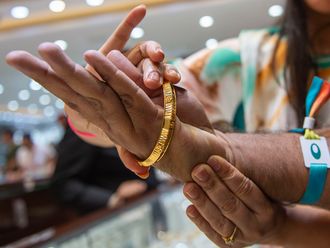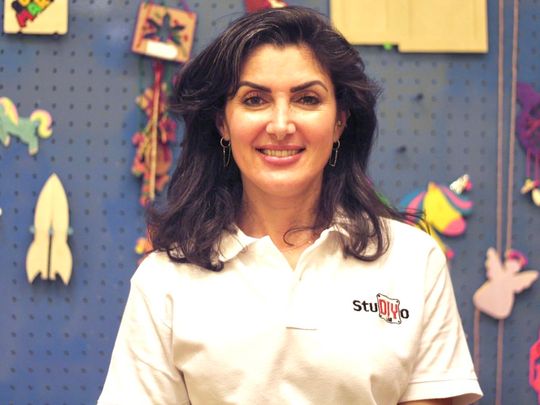
Dubai: When stay-at-home mum Lina Sadek raided her family savings to start a child-friendly woodworking workshop in 2016 – the same year she was diagnosed with cancer – she was acting on an idea conceived as a newbie mother looking for an after-school activity for her then 8-year-old son.
“As a mum to my eldest boy, I recognised that there was a gap in the market for the hands-on activity of woodworking, which would appeal to kids and their creative nature,” the now 54-year-old Dubai-born Palestinian entrepreneur and mother of three, said.
“I initially tested it out on my then 8-year-old son and a group of his friends. We did a pilot that lasted 4 weeks (3 hours on Saturdays) and found that they were totally immersed and engaged whilst also learning many skills without realising it.”
Pre-entrepreneurial experience
Although Sadek soon realised that most young kids were quick to pursue new thrills and discover how woodworking allows them a new avenue to explore, while also taking “safe risks”, she was not in a hurry to start her woodworking studio right away.
Before she started out, the entrepreneur’s dream was initially fuelled by her fascination with how kids play time with toys can be connected to language learning, and so when she attended the annual Hong Kong and Nuremberg toy fairs, she got aspired to open an educational toy shop first.
“When I got into the business of teaching children woodworking, it was a happy coincidence that my motherhood and my interests would help my young son learn by being immersed in the activity or play I exposed him to, and I got very interested in toys or games I would bring to him,” she added.
“This led me to visit toy fairs where I fell in love with inspiring stories inventors had. Many came from corporate backgrounds and left the corporate world to pursue their creative ideas. I just loved this and it resonated with me a lot, and this was definitely the start of my entrepreneurial journey.”
When I got into the business of teaching children woodworking, it was a happy coincidence that my motherhood and my interests would help my young son learn by being immersed in the activity or play I exposed him to
Start-up costs when starting out
Later on, by applying her experience of working with her family's construction company and building exhibition stands, Sadek said the business was first funded by herself and her husband. It was with an initial investment of approximately Dh1.5 million to start StuDIYo Lab as an events company.
“My work background in sales and marketing with a focus on building image and exhibition stands widened my exposure to different industries and made me understand the importance of a brand and what it represents. It taught me to be a creative and agile thinker without realising it,” she said.
“The business first solely focused on delivering woodworking workshops as an after-school program. We started by hiring a very experienced teacher and approaching a handful of schools to take on our program as an after-school program to be offered to their kids in the primary years,” she added.
“Once we started, our expenses were focused on hiring instructors that would host our workshops with the children. When we decided to open our first location at the Times Square Center, Dubai, other than the investment cost to rent out the 1500 sq. ft. space, we invested in equipment too.”
Used by children, families, companies
Sadek’s do-it-yourself (DIY) studio now offers different woodworking programs to schools, individuals, and also corporations. “Schools bring their students to our centre field trips, or we can deliver our workshops to them in their school,” she explained.
“Since our inception, we've partnered with over 10-plus schools and have had thousands of children attend the workshops and classes held at our locations in Dubai and in Abu Dhabi Mall. Families also come together, and corporations use the projects for team building.”
The businesswoman noted how the business reached break-even point in terms of profit overtaking costs and still “continues to go.” “But more importantly, it was pivotal to grow more sensitive to the needs of the children and the goals their families have for them,” she added.
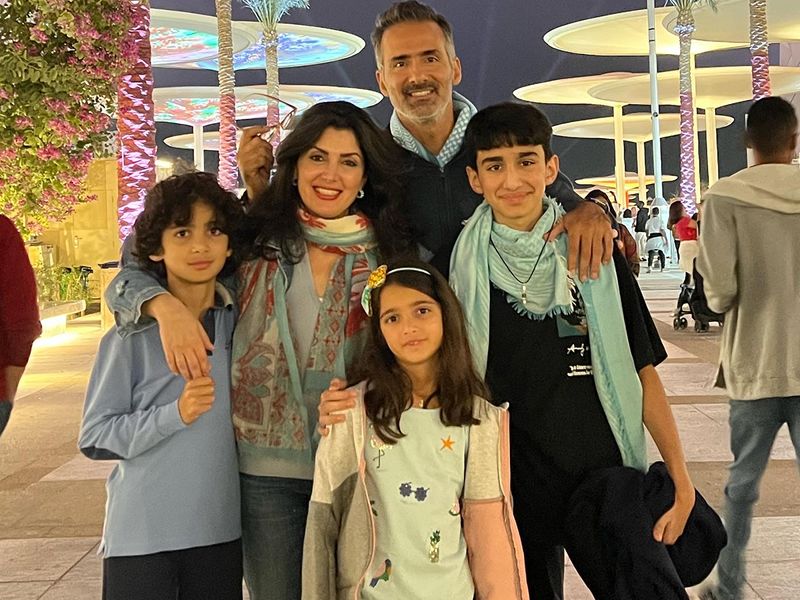
Overcoming challenges when starting out
“When I embarked on this business in 2016, we survived a number of challenges, the biggest one being when the pandemic-induced lockdown restricted activities for kids. However, we managed to redefine the business in the years since.
“I also started with very high ‘overheads’ and a very poor or non-existent marketing plan. This was because I didn’t have the confidence to run my business idea thinking that because I didn’t come from an educational background, this gave me an imposter syndrome.”
(Overheads refer to the costs of running a business that are not directly related to producing a good or service. These costs can be fixed, such as rent, or variable, such as transport costs. They can also be semi-variable, such as utilities.)
Having also fought breast cancer after being diagnosed in December 2016, Sadek said the lessons she learnt from the challenges she faced was key to keep her going. “The journey taught me that my attitude in the face of the adversity of a serious health threat was the key to me overcoming it.”
Personal lessons learnt when managing money
While Sadek considers herself to be a “passionate go-getter” when it comes to running her business, while also believing in a happy work-life balance, she said: “I am a mother first, wife second and businesswoman third.” But when it comes to managing finances, she admits to having a downfall.
“Though I love music, dancing, exploring new ideas and online shopping for everything, my one downfall is that I didn’t initially start off being stringent when budgeting my business expenses, but I've learnt the importance of this through the years from the various people I work with,” she said.
“To be honest, the person who keeps me in check with the budgeting today is my husband - he has great financial sense! And my team. My nature is to spend for the betterment of the business but I have also learnt that budgeting is important - otherwise it can seriously affect cash flow.”

